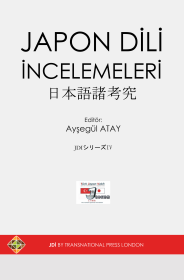Japon Dili Eğitiminde は (wa) ve が (ga) İlgeçleri ve Bu İlgeçlerin Türkçeye Yansımaları
The preposition は (wa) and が (ga) in Japanese Language Education and Their Reflections in Turkish
Author(s): Ayşegül Atay
Subject(s): Language studies, Education, Foreign languages learning
Published by: Transnational Press London
Keywords: Wa; ga; nominative case; preposition; topic; zero morpheme;
Summary/Abstract: Using the Japanese language learned in the classroom setting in a natural environment or in any discourse environment, understanding by the listener and understanding the listener's speech correctly makes communication more fluent. This is the primary purpose of foreign language and Japanese learners. In order to achieve this aim, it is necessary to distinguish the usage difference of wa and ga, which is the basis of Japanese, and the meanings given to the sentence depending on the environment, in other words, to gain the skill of using these two in the correct context. For this reason, the purpose of this study is to describe the difference in meaning of wa and ga due to differences in usage and to determine their transfer to Turkish. In other words, what is the difference between these sentences with the usage of when there is a sentence with the usage of wa or ga; and it gets structurally true? How can such differences in usage and meaning be explained, which is not stated in the context of the coursebooks but whenever it is applied it will make a significent difference? A learner whose native language is Turkish might have difficulties to understand the difference betwen the two in the basic level. It is thought that the difference between the usage and meaning of the two can be explained in discourse environments. In this study, in terms of the opposition of “known” wa and “unknown / new knowledge” ga of Imamura (2002), the reflection of meaning differences of wa and ga on the basis of examples and environments in the literature were examined. As a result, a proposal has been presented to the learners and teachers in the field of Japanese teaching to be applied in classroom practices.
Book: Japon Dili İncelemeleri / 日本語諸考究
- Page Range: 211-229
- Page Count: 19
- Publication Year: 2018
- Language: Turkish
- Content File-PDF

